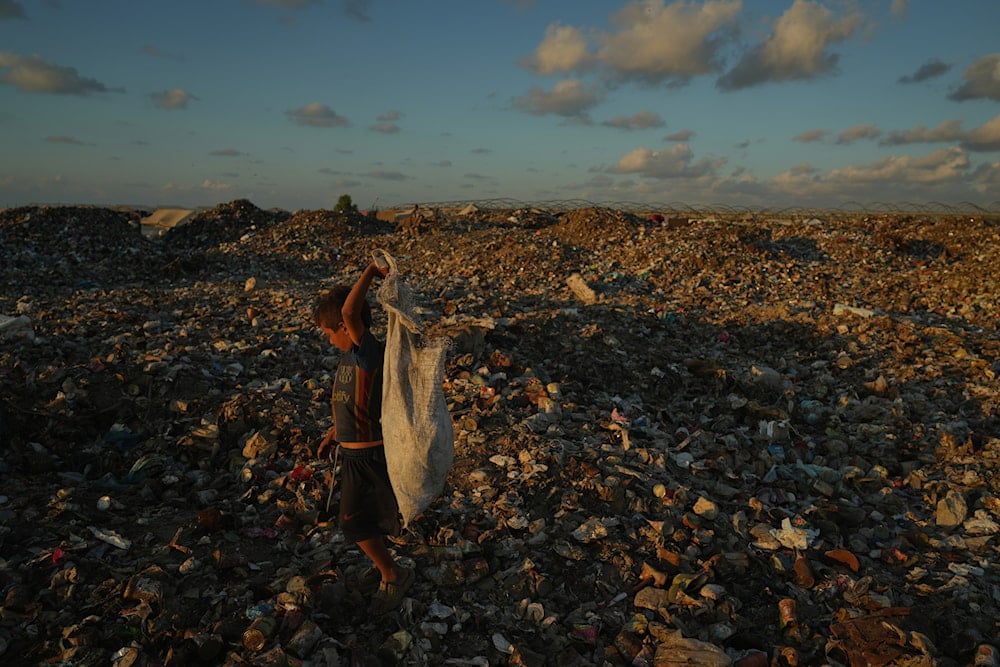In 2 years, 'Israel' dropped 200,000 tons of explosives on Gaza
As the Israeli genocide in Gaza enters its third year, officials warn of famine, disease, and the destruction of nearly all hospitals, schools, and homes under Israeli bombardment.
-

A forcibly displaced Palestinian child searches for firewood and plastic in a landfill beside the makeshift tent camp where his family is taking shelter, in Khan Younis, southern Gaza Strip, Tuesday, Sept. 30, 2025, amid Israeli genocide. (AP)
The Gaza Government Media Office has released a new report marking two years since the start of what it described as an “ongoing Israeli genocide,” citing catastrophic levels of destruction, mass displacement, and tens of thousands of civilian killings across the besieged enclave.
According to the statement issued Sunday, more than 76,600 Palestinians have been killed or remain missing since the war began on October 7, 2023, when "Israel" launched a large-scale aggression on Gaza. Of those, 67,139 killings have been confirmed in hospitals, while nearly 9,500 people remain unaccounted for, many believed to be buried beneath the rubble.
Gaza authorities said that children, women, and the elderly make up more than half of the victims, with over 20,000 children and 12,500 women among the martyrs. The report described entire families wiped from the civil registry, stating that 2,700 families have been completely erased and over 6,000 others left with a single surviving member.
‘Two years of annihilation’
The Media Office said "Israel’s" bombardment and ground offensives have destroyed nearly 90 percent of Gaza’s infrastructure, leaving the territory in “total humanitarian collapse.” It is estimated that over 80 percent of the Strip’s land is now under Israeli occupation, while more than 2 million civilians have been forcibly displaced, many multiple times.
The statement accused "Israel" of waging a campaign of “starvation and ethnic cleansing,” reporting that over 200,000 tons of explosives have been dropped on Gaza in two years. It added that the so-called “safe humanitarian zone” of al-Mawasi has been bombed more than 130 times.
Collapse of basic services
The Office’s figures highlight a humanitarian system on the brink. It reported that 38 hospitals and 96 clinics have been destroyed or rendered inoperable, while 197 ambulances were hit during Israeli strikes. More than 1,600 medical workers have been killed, alongside 254 journalists, 140 civil defense members, and 540 aid workers, according to the report.
With more than 169,000 people injured, officials said Gaza’s overwhelmed hospitals lack the capacity to provide adequate care. The report added that 22,000 patients approved for treatment abroad remain trapped inside Gaza, while 650,000 children face life-threatening hunger amid severe shortages of food, medicine, and infant formula.
International agencies have repeatedly warned of famine in parts of Gaza. The United Nations has said the territory’s 2.4 million residents are enduring “unprecedented levels of deprivation,” with nearly all dependent on humanitarian aid.
Education and culture in ruins
The Media Office said 95% of Gaza’s schools have been damaged, and 165 educational institutions completely destroyed. It reported the deaths of 13,500 students, 830 teachers, and nearly 200 academics and researchers.
Places of worship have also been heavily targeted, with the total destruction of 835 mosques and severe damage to several churches. Dozens of cemeteries have been bulldozed or bombed.
Furthermore, the Gaza authorities estimate direct losses across 15 sectors at $70 billion, including $28 billion in housing, $5 billion in health, and $4 billion in education. Nearly all farmland and fisheries have been wiped out, the report added, threatening long-term food security.
International calls for accountability
The report concluded by urging the international community to act “before Gaza disappears completely,” calling on world governments to pressure "Israel" to lift the blockade and allow unrestricted humanitarian access.
UN officials and human rights organizations have echoed calls for independent investigations into war crimes, though political divisions within the UN Security Council have repeatedly stalled resolutions demanding an end to the genocide.
As the war enters its third year, Gaza remains almost entirely in ruins, its people forcibly displaced, starved, and struggling to survive amid what local authorities describe as “730 days of killing and ethnic cleansing.”

 4 Min Read
4 Min Read










